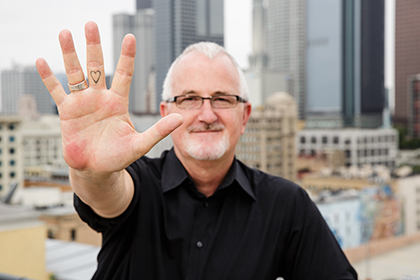AARP Hearing Center

By Laura Mecoy • Yolanda “Miss Liz” Lizarraga had lost one kidney to cancer, and the remaining one was functioning so poorly that she faced the prospect of spending three days a week undergoing dialysis. She could avoid that long-term fate only by improving her diet.
With a limited budget and poor eyesight, the retired Los Angeles fourth-grade teacher could neither cook for herself nor afford dining out regularly. So she turned to St. Vincent Meals on Wheels.
Lizarraga, 57, credits the daily kidney-friendly vegetarian meals she now gets with keeping her off dialysis.
Sister Alice Marie Quinn, St. Vincent Meals on Wheels’ founder, executive director and dietitian, creates meal plans for Lizarraga and other clients. Although fresh fruits and vegetables are essential to a healthy diet, Quinn said programs like hers can’t afford all the fresh produce they need. She’s looking forward to the opening late this year of the L.A. Kitchen, a nonprofit that plans to collect millions of pounds of California’s fruits and vegetables and provide them for free or at a very low cost to dozens of food programs in Los Angeles such as St. Vincent Meals on Wheels.
Combating hunger
Founded by Robert Egger, the L.A. Kitchen is designed to help fight hunger in older adults by supplying them with healthy food. Egger is building on his success in the nation’s capital with DC Central Kitchen. Since 1989, it has turned donated leftover food from restaurants, hotels and other businesses into meals for low-income individuals.
The L.A. Kitchen plans to gather donated or affordable produce and peel, slice, dice, flash freeze or otherwise prepare it for nonprofit agencies to use in making the meals they provide to vulnerable Angelenos.
The most recent data from Feeding America, a national network of food banks, show almost 17 percent of Los Angeles County residents don’t have access to adequate food. A fourth of those do not qualify for government food assistance and rely on charitable organizations.
In addition, Strong Food, the for-profit arm of the L.A. Kitchen, will buy locally grown overripe and imperfect fruits and vegetables at a reduced price. Its staff will prepare and sell the produce to nonprofit and for-profit programs at a competitive price.
Around Los Angeles, “there is an almost unlimited supply of fresh fruits and vegetables available for free or at very low cost,” Egger said. “We can use that food not only to feed the older generation healthier food but also to train men and women for jobs in the culinary business.”
Kitchen, life skills training
The programs also will provide training and life skills to older adults returning from prison and young people who are aging out of foster care. In addition to learning their way around a kitchen, the participants will engage in group therapy, life skills classes and team building exercises—all while cooking.
“It’s not a school,” Egger said. “It’s a community-building program in which students are equal participants and subsequent employees.”
AARP Foundation, the charitable affiliate of AARP, has pledged $1 million over three years to the L.A. Kitchen.
Maxine B. Baker, a senior vice president at AARP Foundation, said she hopes the L.A. Kitchen approach will be a model for other communities “to leverage their resources to identify community-based sustainable solutions. “This model will address several needs of the vulnerable 50-plus population—hunger, income and isolation,” she said.
Ensuring older Americans thrive is a goal of St. Vincent Meals on Wheels, where Quinn oversees the preparation of 4,000 meals a day for homebound Angelenos and people in need of food assistance.
“Produce has always been our biggest budget item,” she said. “The L.A. Kitchen is going to be a great partner for us.”
As for Lizarraga: “I am doing really great,” she said. “I always get two vegetables and two servings of fruit, and I am very happy because I don’t have to be on dialysis.”
Laura Mecoy is a writer living in Los Angeles































































